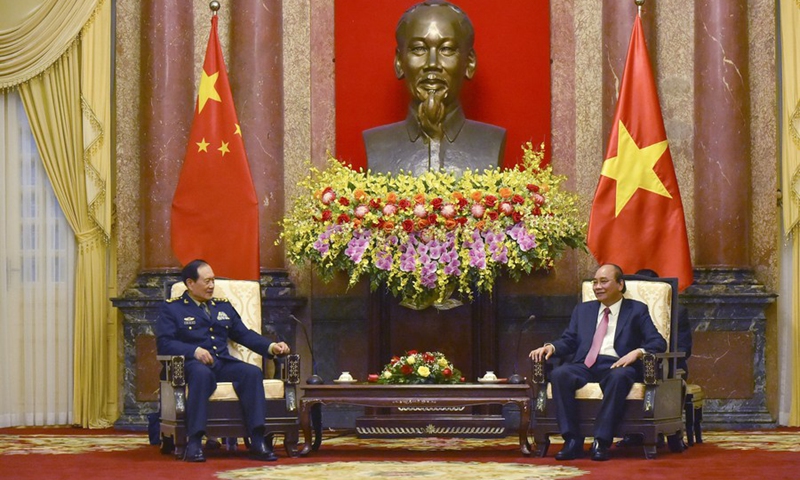
Vietnamese President Nguyen Xuan Phuc (right) meets with visiting Chinese State Councilor and Minister of National Defense Wei Fenghe (left) in the Vietnamese capital Hanoi, April 26, 2021. Photo: Xinhua
Vietnam opposes any forces' interfering in China's internal affairs. The country will stay on guard against and firmly resist any schemes to undermine China-Vietnam relations, and will never follow other countries in opposing China, Vietnamese President Nguyen Xuan Phuc said on Monday in his meeting with Chinese State Councilor and Defense Minister Wei Fenghe.
Phuc's remarks show not only his personal attitude toward China, but also a collective stance of the Communist Party of Vietnam (CPV) on relationship with China after the 13th National Congress of the CPV in early 2021. Against the backdrop of the Biden administration devoting itself to forming an anti-China front, Phuc's remarks have made a clear pledge not only to China, but actually to the US. That is, Hanoi will not be involved in major power competition between China and the US. Nor will it take sides with the US to deal with China.
Both China and the US are of great significance to ASEAN members. Southeast Asian countries, including Vietnam, are reluctant to take a side to join US' campaign to directly contain and suppress China. This has become a trend. Among these countries, Vietnam is specific on this due to its political system. As socialist countries, China and Vietnam have similar postures on many international affairs, and they need to support each other on various occasions.
Washington has been attempting to rope in Southeast Asian countries, seeking to expand its influence in Southeast Asia. But those countries have adopted a pragmatic manner. This, to some extent, has offset US' efforts to counter China in the region. It is true that some public opinions in Southeast Asian countries welcome and support US' influence and interference in regional affairs. This may make US' meddling possible. China should remain vigilant and pay essential attention to it.
With regard to Chinese fishing boats sheltering from the wind at Niu'e Jiao, a part of China's Nansha Islands, Vietnam has in recent days joined the Philippines to express opposition.
The South China Sea disputes have been a part of Beijing-Hanoi relations. According to its past practice, it is not unpredicted to see Vietnam, one of the South China Sea claimants, make noises over some spats in the waters. But currently, the divergences between Beijing and Hanoi on the South China Sea are merely a minor factor in their overall bilateral ties. Judging from narratives made by top officials of both China and Vietnam, maintaining friendship and cooperation between the two countries is the mainstream. But in the long-run, with the change of international situation and change of political and nationalist sentiment in Vietnam, the South China Sea may impact bilateral relations between China and Vietnam to varying degrees.
Some foreign media outlets are provoking Beijing-Hanoi ties. For example, an opinion piece published on April 6 in Nikkei news said, "Chinese aggression pushes Vietnam ever closer to Washington." The article anticipated that China-Vietnam relations could "deteriorate still further." India-based Asian News International said on April 8 in its post that "Beijing's increasing belligerence toward Vietnam and the anti-China sentiment in the country is pushing Vietnam closer toward the US."
Their judgment toward current China-Vietnam relations cannot be seen as proper. At present, political relations between the two countries are very sound, with their differences on the South China Sea under management. In this context, even if the US steps up its attempts to woo Vietnam, the South China Sea issue will not make a big wave in China-Vietnam relations.
Furthermore, the Biden administration has attached great importance to values-based diplomacy, which will pose challenge for not only China, but also Vietnam - another socialist country whose values are different from that of the US. Therefore, Hanoi will keep vigilant toward Washington's such diplomatic moves. This being the case, US' efforts to rope in Vietnam or provoke the relationship between China and Vietnam will not affect Vietnam's ties with China at least in the short term.
The author is research fellow and deputy director at the Institute of International Relations of the Shanghai Academy of Social Sciences. opinion@globaltimes.com.cn




